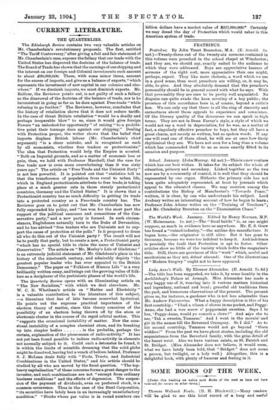CURRENT LITERAT UR,E.
TILL QUARTERLIES.
The Rclinbwrgh Review contains two very valuable articles on Mr. Chamberlain's revolutionary proposals. The first, entitled "The Tariff Controversy," after giving shill and fair statement of Mr. Chamberlain's case, exposes the fallacy that our trade with the United States has disproved the doctrine of the balance of trade. The Board of Trade has shown that the earnings of our shipping and the interest on our foreign and Colonial investments each amount to about £90,000,000. These, with some minor items, account for the excess of imports, and give us a balance of exports, "Which represents the investment of new capital in our colonies and else- where." If we diminish imports, we must diminish exports. Mr. Balfour, the Reviewer points out, is not guilty of such a fallacy as the disavowal of the doctrine of the balance of trade, nor is he inconsistent in going as far as he does against Free-trade "while refusing to go further." The Reviewer, however, concludes that the history of retaliation shows that it does not reduce tariffs. In the case of Great Britain retaliation "would be a deadly and perhaps irreparable blow" to us, since it would give foreign Powers "an unlooked-for opportunity" of raising "to a prohibi- tive point their tonnage dues against our shipping." Dealing with Protection proper, the writer shows that the belief that imports displace British labour (Mr. Chamberlain's chief argument) "is a, sheer mistake, and is recognised as such by all economists, whether free traders or protectionists." The idea that Protection would help the Empire is scouted. "Both on Imperial grounds, and as a matter of economic loss or gain, then, we hold with Professor Marshall, that the ease for free trade now is even more overwhelming than it was sixty years ago." The article on "Free Trade and the Unionist Party" is not less powerful. It is pointed out that "statistics tell us that the transference of population from rural to urban life, which in England protectionists attribute to free trade, is taking place at a much greater rate in those sternly protectionist countries, Germany and the United States." It is shown that a Protectionist country has as much difficulty in getting its trade into a protected country as a Free-trade country has. The Reviewer goes on to point out that Mr. Chamberlain has now fully expounded his policy, and "has won for the most part the support of the political caucuses and committees of the Con- servative party," and a new party is formed. In such circum- stances, Englishmen naturally turn to the Duke of Devonshire, and he has advised "free traders who are Unionists not to sup- port the cause of protection at the polls." Is it proposed to drum ll who do this out of the Unionist party ? The result will not be to purify that party, but to create a new, a Protectionist party "which has no special title to claim the name of Unionist and Conservative." The article on "Mr. Morley's Life of Gladstone" is an extremely judicial statement of Mr. Gladstone's place in the history of the nineteenth century, and admirably depicts "the greatest popular leader who has ever appealed to the British Democracy." The paper on "Folklore of Human Life" is a very brilliantly written essay, and brings out the growing value of folk- lore as a decipherer of the prehistoric phases of the world's life.
The Quarterly Review opens with an illuminating article on " The New Socialism," with which we deal elsewhere. Mr. W. C. D. Whetham's article on "Matter and Electricity" is a valuable contribution to the literature of this subject, —a literature that has of late become somewhat hysterical. He points out the supreme practical importance of the electron theory of matter, since this theory conceives of the possibility of an electron being thrown off by the atom or electronic cluster in the course of its rapid orbital motion. This "suggests the occasional instability of matter. Now the occa- sional instability of a complex chemical atom, and its breaking
up into simpler bodies is the probable, perhaps the certain, explanation of the phenomena of radio-activity." It has not yet been found possible to induce radio-activity in elements not normally subject to it. Could such a detonator be found, it is within the limits of scientific dreaming that the solid globe might be dissolved, leaving but a wrack of helium behind. Professor S. J. McLean deals fully with "Pools, Trusts, and Industrial Combinations in the United States," and his article should be studied by all who are moved by the fiscal question. "The top- heavy capitalisation" of these concerns forms a great danger to the investor, and such combinations are not "exempt from ordinary business conditions" and the effects of depression. The suspen- sion of the payment of dividends, even on preferred stock, is a common occurrence. Thus in the case of the Steel Corporation, "its securities have lately been in an increasingly unsatisfactory condition." "Stocks whose par value is in round numbers one
;
billion dollars have a market value of $821,000,000.0 Certainly we may dread the day of Protection which would usher in this American system of trade.










































 Previous page
Previous page